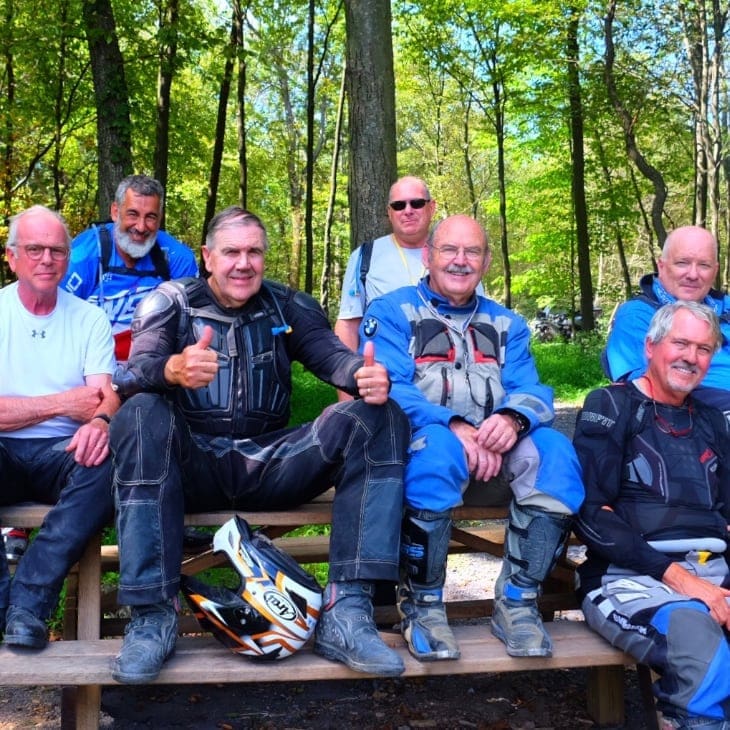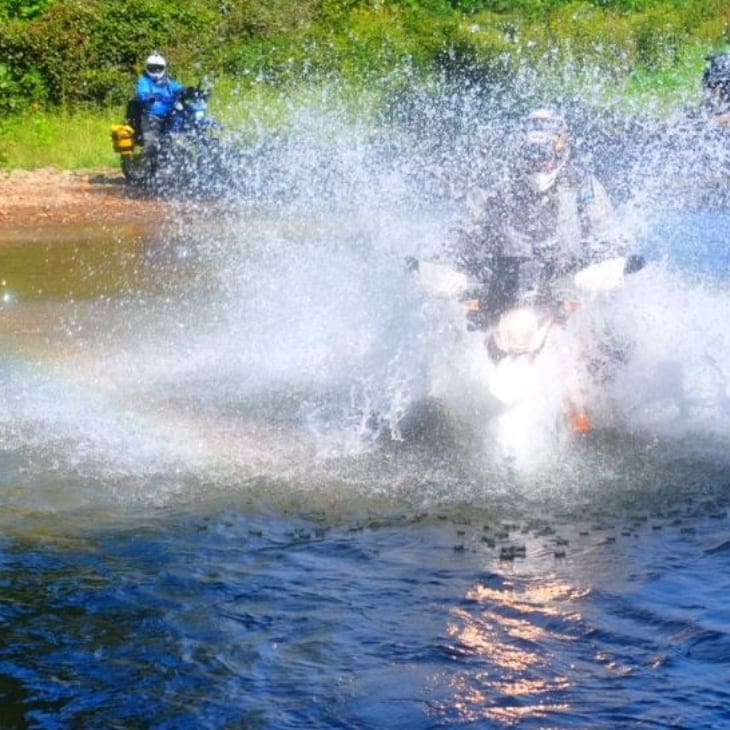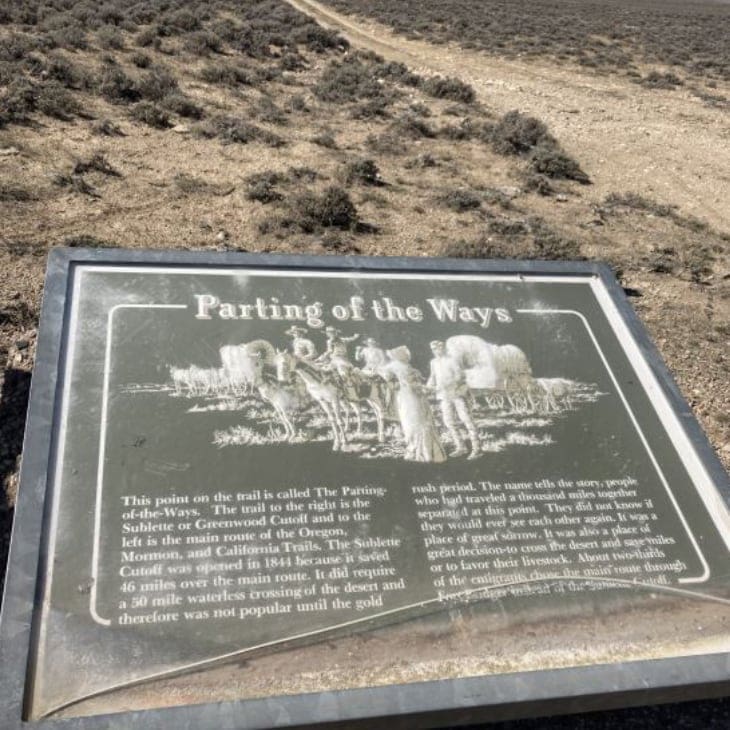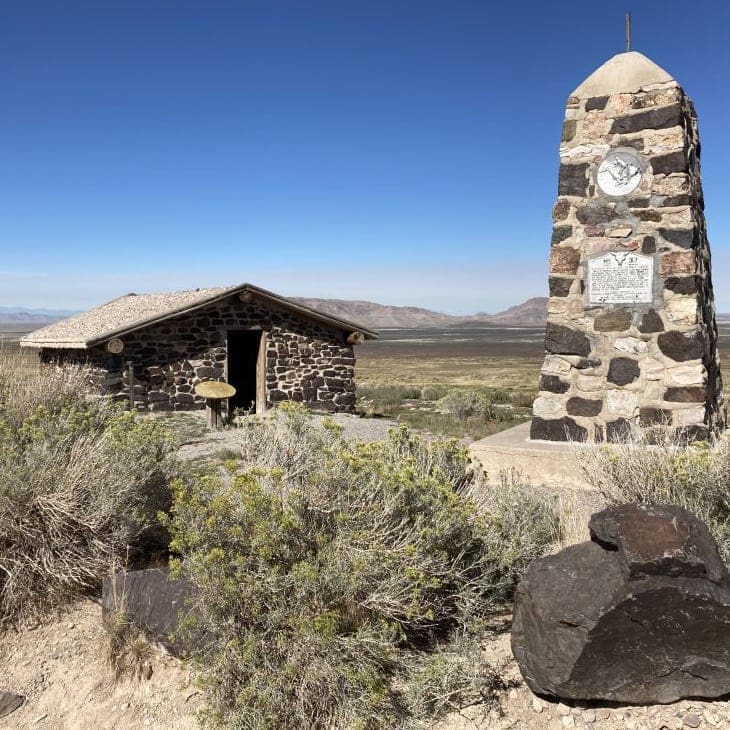Actually, he gave it the ultimate off-road test. Literally.
Along with 19 fellow gearheads dubbed the “Kokopelli Adventure Riders” (a nod to the Native American deity of fertility and mischievousness), he navigated rugged off-road terrain for 13 days. He motored his way across six states—starting in Colorado and pushing northwest through Utah, Wyoming, Idaho, Nevada and Montana.
“We rode the Pony Express Trail and part of the Oregon Trail. We actually rode right in the wagon tracks that are still out there in an area of Wyoming called the Big Empty. Six million acres of nothing,” he enthuses.
For Watson, it was a bucket-list adventure he’d first done in 2014. He and his buddies enjoyed it so much they put it back on the top of their list for 2021.He wasn’t about to have annoying urine leaks spoil the fun. And they didn’t—not once.
Braking for Prostate Cancer
Keith Waguespack, M.D., one of the founding partners at Urology Partners of North Texas, is Watson’s neighbor. He also just happens to be his trusted urologist. Together, they’d been tracking Watson’s level of prostate specific antigen (PSA) in Watson for some time.
“My PSA was a little over 3, so it wasn’t significantly high, but it had gone from 1.8 to 3.2 in a six-month period,” Watson reveals. “Dr. Waguespack ordered an MRI. It showed some suspicious areas, and a biopsy confirmed I had prostate cancer.”
Watson underwent a robot-assisted laparoscopic prostatectomy performed by Dr. Waguespack in January 2019.
“It went well, although when they took samples from around the surgical area, they found a few cancer cells in those samples,” he adds. “I had a very high risk that my cancer would come back, so we’ve been watching it carefully. I get a PSA test every three months. Thankfully, it’s been undetectable every time.”
During the two years he was on close surveillance, Watson grappled with leakage.

“When I was first diagnosed with prostate cancer, Dr. Waguespack recommended a book, and I read every page of it. It covered all the different treatment options and the possible side issues that could happen after surgery, so I knew there was a risk I might leak. I had to use one to two pads a day—which was manageable, but annoying. If I played golf, I might have to use two pads. It was aggravating when I found myself in a situation where it wasn’t convenient to change a pad. Still, I’d read about people who have to use seven to 12 pads a day—which I couldn’t imagine. I was ready to put pads behind me. I’d research my treatment options, but I wanted to wait and see if I would need to undergo chemotherapy or radiation. I wanted to deal with that before I started addressing the leakage issue. That’s what kept me from doing anything sooner.”
After two years of racking up undetectable PSA levels, Watson felt ready to move forward. “Dr. Waguespack told me he’s only had one other patient with a similar stage of cancer who had an undetectable ultrasensitive PSA for two years. He had me do a CT scan and another MRI just to make sure nothing was showing up anywhere.”
Shifting into Survivor Mode

With a clean bill of health, the 73-year-old Watson decided to put leaks in the rearview mirror and make his very active lifestyle pad free. Dr. Waguespack recommended Watson see his partner, Keith Xavier, M.D.
“I’m a communicator,” Watson acknowledges. “I don’t want to play games. I want the truth. I thought Dr. Xavier was very thorough, and that made me feel very comfortable. I’d been doing a lot of research and knew about the sling and other treatment options, including medications that could possibly help. In the end, I chose to go with the Advance XP sling.”
Urodynamics testing confirmed Watson was a good candidate for the sling.
“When Dr. Xavier and I first had the conversation about it, he said the odds were 75 percent that I’d be dry afterward. I thought, 75 percent and I’ve got to go through all that?”
Watson’s Urodynamics results improved his odds, though. “After seeing that his leakage was fairly mild, I felt pretty confident that Mr. Watson’s odds would be better than normal,” Dr. Xavier explains.
Fueled by the good news, Watson decided to go for it.
Making It Through the Pocket

During the surgical procedure, Dr. Xavier used a strip of soft synthetic polypropylene woven suture to create a hammock across the urethra in the area where the sphincter normally contracts and cuts off urine flow. “The sling compresses the urethra and partially kinks it off to prevent urine leaks,” Dr. Xavier explains.
“For a while afterward, I wasn’t so sure it was a good idea,” Watson admits. “The actual surgery and recovery time was a lot more than I thought it would be. My recovery from the robotic prostate surgery was much easier. The sling surgery was a lot more invasive.”
Watson admits there’s one thing he wishes he hadn’t done. “I watched the procedure on YouTube before I had it. I never should have done that,” he laughs. “But at the end of the day, it was certainly worth it. It’s so much better not having to do leak prevention. It wasn’t serious, but it was something I had to deal with all the time.”
Of course, Watson’s looming off-road adventure provided plenty of incentive to power through his recovery.
“I had the surgery on July 6, and did nothing for the first six weeks after the surgery. I was a perfect patient,” he says. “I didn’t lift anything over 10 pounds or do anything, which is really hard for me because I’m very active.

“I told Dr. Xavier before I had my surgery about my upcoming trip. I’m not sure he really got the idea of what I would be doing. So, when I saw him for my follow-up visits, I reminded him, ‘I’ll be riding on roads that are dirt, rock and sand. I stand up on the motorcycle a lot in really rough territory. I just want to make sure there isn’t any chance I could dislodge this thing.’ He said it was possible.”
“I’ve never had a patient who went off-roading so soon after their sling surgery,” Dr. Xavier admits. “I’ve never had anybody do anything like that. So, while I said it was possible, I didn’t think it was probable. I’m very happy that Mr. Watson was able to fully enjoy his off-road adventure without any leaks.”
Watson hit the road exactly 10 weeks after his sling surgery.
“It was great. No problems at all. I worried a bit on my way out there, but once I was on the bike, I was focused on keeping it upright in the sand and navigating through rocky areas and washouts. You don’t think about anything other than focusing on the job at hand. After a couple of days, I thought this thing is working pretty good.”
Watson is pleased that life post his off-road adventure is still good. “The sling is still doing its job,” he happily reports.
Are you living with leaks?
The skilled and experienced physicians at Urology Partners can help. Reach out to us at 866-367-8768.


